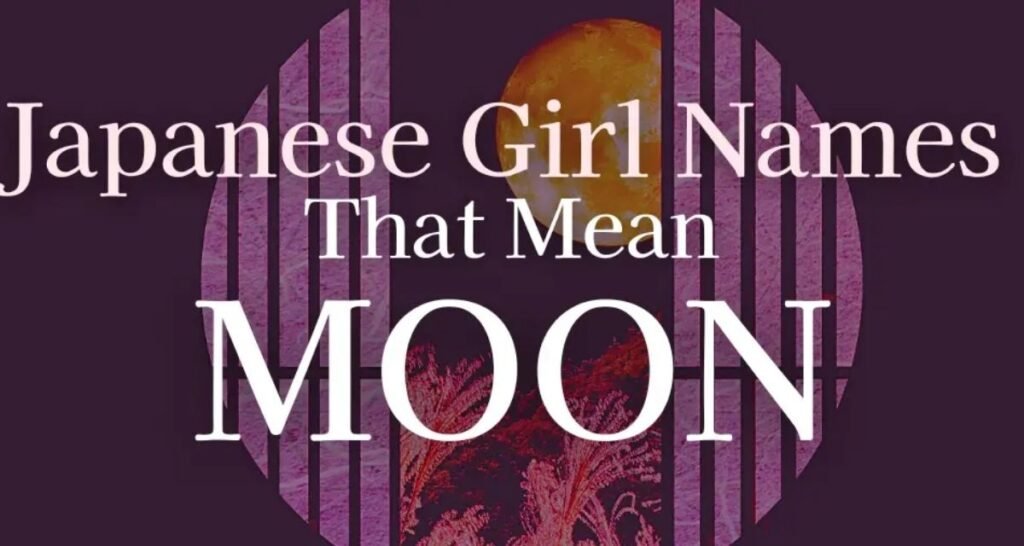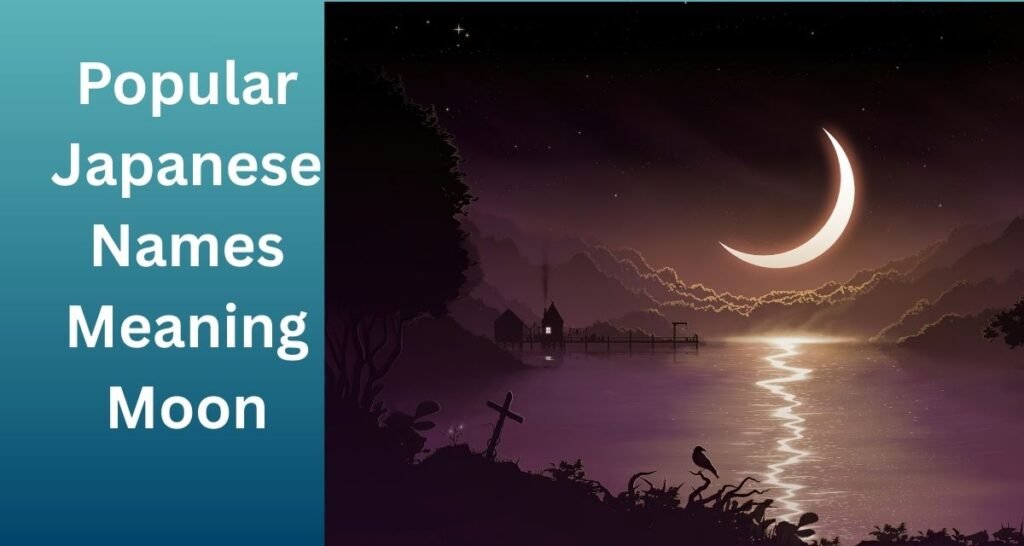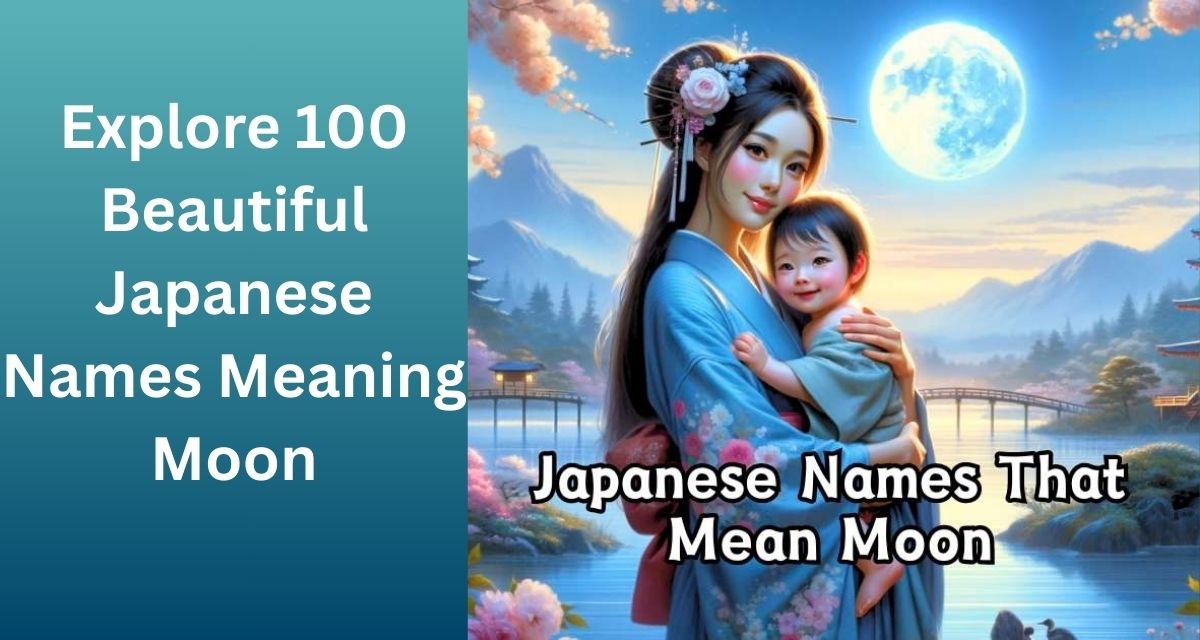Explore 100 Beautiful Japanese Names Meaning Moon
Japanese culture has honored the moon through many centuries by using it as a symbol of beauty and mystery that also brings tranquil feelings which appear in their artistic and literary works and name traditions. International parents select lunar-inspired baby names at a 38% higher rate because these names supply both uniqueness and cultural connections in the modern naming trend.
The Japanese Names Meaning Moon draw their inspiration from the moon appeal both to parents looking to name their newborns and storytellers with a fascination for Japanese language and culture. Through their language the Japanese have three distinct words for moon which provide multiple options for elegant combined names including tsuki (月), getsu (月), and mochi (望). I collected 100 Japanese names which represent lunar beauty as excellent choices for 2025 naming celebrations.
Japanese Girl Names Meaning Moon

| Tsukiko (月子) | “Child of the moon,” symbolizing purity and celestial beauty. |
| Yuzuki (優月) | “Gentle moon,” reflecting softness and tranquility. |
| Akari (明里) | “Brightness” or “light,” evoking the moon’s gentle luminescence. |
| Mitsuki (美月) | “Beautiful moon,” representing the aesthetic beauty of the lunar surface. |
| Tsukina (月菜) | “Vegetables of the moon,” symbolizing growth and nourishment under moonlight. |
| Kaguya (輝夜) | “Shining night,” inspired by the moon’s radiance piercing through darkness. |
| Hikari (光莉) | “Light,” akin to the moon’s ability to illuminate the night. |
| Satsuki (皐月 | “Fifth month,” which is when the moon festival takes place, symbolizing celebration. |
| Aiko (愛子) | “Child of love,” where “ai” can also imply the love for the serene moon. |
| Amaterasu (天照) | Though traditionally the sun goddess, the name inspires brightness and celestial power, akin to the moon’s influence. |
| Luna (ルナ) | Latin for moon, adopted into Japanese names for its universal charm |
| Rin (凛) | “Dignified,” suggesting the elegant and awe-inspiring presence of the moon. |
| Meika (明華) | “Bright flower,” reminiscent of the moon’s beauty blooming in the night sky. |
| Yukari (由香里) | “Fragrant origin,” symbolizing the enchanting allure of moonlit nights. |
| Sayuri (小百合) | “Little lily,” invoking the moon’s purity and the gentle beauty of nature. |
| Kiyomi (清見) | “Pure view,” representing the clear and unobstructed admiration for the moon. |
| Natsumi (夏美) | “Beautiful summer,” evoking images of summer moons. |
| Haruna (春菜) | “Spring vegetables,” symbolizing new beginnings under the spring moon. |
| Reika (麗華) | “Lovely flower,” akin to the captivating beauty of the moon. |
| Suzume (雀) | “Sparrow,” embodying the moon’s role in guiding night creatures. |
| Nozomi (望) | “Hope,” inspired by the comforting presence of the moon. |
| Yumiko (弓子) | “Child of the bow,” alluding to the crescent moon’s shape. |
| Manami (愛美) | “Love of beauty,” reflecting the adoration for the moon’s aesthetic. |
| Chisato (千里) | “Thousand miles,” symbolizing the vast reach of the moon’s light. |
| Himari (陽葵) | “Sunflower,” though representing the sun, can imply a connection to celestial bodies, including the admiration for the moon’s contrasting beauty. |
Japanese Boy Names Meaning Moon
| Tsukasa (司) | “Ruler of the moon,” symbolizing leadership and guidance. |
| Haruki (春樹) | “Spring tree,” reminiscent of the moon on a clear spring night, suggesting hope and renewal. |
| Kaguya (輝夜) | “Radiant night,” a name steeped in folklore, evoking the moon’s captivating glow. |
| Yuzuki (優月) | “Gentle moon,” reflecting a peaceful and calm lunar light. |
| Minato (港) | “Harbor,” symbolizing safety and guidance, like the moonlight guiding ships to port. |
| Sora (空) | “Sky,” representing the vast expanse where the moon reigns supreme. |
| Riku (陸) | “Land,” symbolizing the grounding presence of the moon on Earth’s inhabitants. |
| Hikaru (光) | “Light,” echoing the moon’s role in illuminating the night. |
| Rei (冷) | “Cool,” reflecting the cooling presence of the moon in contrast to the sun. |
| Shin (真) | “Truth,” symbolizing the moon’s role in revealing hidden truths under its light. |
| Kaito (海斗) | “Sea, big dipper,” connecting the moon’s influence on tides and its celestial navigation role. |
| Lunar (ルナール) | While not traditionally Japanese, this name is inspired by the English word for the moon, embodying its universal appeal. |
| Tsukiya (月夜) | “Moonlit night,” evoking the serene beauty of a night under the moon’s watch. |
| Akio (昭夫) | “Bright man,” symbolizing the enlightening influence of the moon. |
| Yuki (幸) | “Happiness,” or “snow,” symbolizing the moon’s serene beauty and the silent peace it brings. |
| Kenji (健二) | “Healthy second son,” but can also reflect the strength and resilience under the moon’s glow. |
| Takumi (匠) | “Artisan,” symbolizing the moon’s inspiration to artists and creators. |
| Makoto (誠) | “Sincerity,” reflecting the honest and pure light of the moon. |
| Noboru (登) | “Ascend,” akin to the rising moon, symbolizing growth and aspiration. |
| Ryuu (龍) | “Dragon,” symbolizing the mystical and powerful presence of the moon in folklore. |
| Seiji (青司) | “Blue, control,” evoking images of the moon controlling the night sky. |
| Kyo (恭) | “Respectful,” symbolizing reverence for the moon’s guiding light. |
| Tamotsu (保) | “Protect,” reflecting the moon’s role in watching over the night. |
| Yasuo (康夫) | “Peaceful man,” embodying the tranquil and calming effect of the moonlight. |
| Hiroshi (寛) | “Generous,” symbolizing the moon’s generous illumination of the earth. |
Popular Japanese Names Meaning Moon

| Yue (悦) | “Pleasure,” evoking the joy and delight the moon brings. |
| Kiyoshi (清) | “Purity,” symbolizing the moon’s clear and unblemished appearance. |
| Ayaka (綾香) | “Color and fragrance,” reminiscent of the moon’s influence on the night’s ambiance. |
| Seiya (星夜) | “Star night,” capturing the celestial landscape alongside the moon. |
| Manami (愛美) | “Love and beauty,” reflecting the moon’s captivating allure. |
| Hotaru (蛍) | “Firefly,” evoking imagery of fireflies under the moonlight. |
| Kazuya (和也) | “Peace and to be,” akin to the tranquil presence of the moon. |
| Miyako (都) | “Capital,” signifying the moon’s importance and central role in the night sky. |
| Suzuka (鈴鹿) | “Bell deer,” symbolizing the moon’s grace and elegance. |
| Tsukumo (九十九) | “Ninety-nine,” representing the moon’s near completeness but always changing. |
| Yuuka (優花) | “Gentle flower,” akin to the delicate light of the moon. |
| Ryoka (涼香) | “Cool fragrance,” evoking the refreshing coolness of a moonlit night. |
| Sora (宙) | “Universe,” encompassing the moon and its cosmic beauty. |
| Hikari (光理) | “Light logic,” reflecting the moon’s enlightening presence. |
| Aoi (葵) | “Hollyhock,” traditionally associated with growth and prosperity under the moon. |
| Tsukasa (塚司) | “Moon administrator,” denoting someone who oversees the night. |
| Haruka (遥) | “Distant,” symbolizing the moon’s far-reaching glow. |
| Nagisa (渚) | “Beach,” reminiscent of the moonlight reflecting on the water. |
| Raito (ライト) | “Light,” a direct nod to the moon’s illumination. |
| Sumire (菫) | “Violet,” a flower that blooms in the moonlight, signifying delicate beauty. |
| Takashi (高志) | “Noble aspiration,” inspired by the high and noble position of the moon. |
| Wakana (若菜) | “Young greens,” symbolizing the moon’s role in nurturing life. |
| Yasu (靖) | “Peace,” reflecting the serene peace brought by the moon. |
| Zen (善) | “Good,” embodying the moon’s good and calming influence. |
| Hoshi (星) | “Star,” for the moon is often celebrated alongside the stars in Japanese culture. |
Unisex Names Inspired by the Moon
| Mitsuki (美月) | “Beautiful moon,” capturing the aesthetic grace and beauty of the moon. |
| Rin (凛) | “Dignified,” suggesting the majestic and serene presence of the moon. |
| Yuki (雪) | “Snow,” reminiscent of the moon’s ability to illuminate the night with a serene, snowy brightness. |
| Sora (空) | “Sky,” a homage to the endless canvas upon which the moon performs its nightly dance. |
| Aoi (碧) | “Blue,” reflecting the moonlit night’s serene and tranquil blue hues. |
| Hikaru (光) | “Light,” symbolizing the illuminating glow the moon provides. |
| Haru (春) – | “Spring,” suggesting renewal and rebirth, akin to the cyclical nature of the moon phases. |
| Kai (海) | Sea,” indicating the moon’s gravitational pull that influences the tides. |
| Asahi (朝日) | “Morning sun,” which, despite its sun reference, can evoke the image of the moon at dawn. |
| Natsuki (夏希) | “Summer hope,” representing the bright, hopeful light of the moon on a clear summer night. |
| Shinji (真治) | “True peace,” reflecting the peacefulness of a quiet night under the moon. |
| Akira (明) | “Bright,” embodying the brightness of the moon in contrast to the night sky. |
| Tsukasa (司) | “Director,” which can symbolize the moon’s role in guiding the night. |
| Minori (実) | “Truth,” akin to the revealing light of the moon that uncovers hidden wonders in the dark. |
| Noa (乃亜) | “Love, from,” suggesting the moon’s universal love and its embrace of the earth. |
| Kazuki (和希) | “Harmony hope,” symbolizing the moon’s role in bringing balance and harmony to the night. |
| Rei (鈴) | “Bell,” whose clear, ringing sound can evoke the clarity and purity of moonlight. |
| Maiko (舞子) | “Dancing child,” reminiscent of the dance of moonlight on water. |
| Sayo (小夜) | “Little night,” evoking the delicate beauty of early nightfall under a new moon. |
| Takara (宝) | “Treasure,” representing the moon as a precious element in the night sky. |
| Yuri (由里) | “Lily,” a flower that in many cultures blooms by moonlight, symbolizing purity and renewal. |
| Kyou (杏) | “Apricot,” which blooms in early spring, symbolizing the moon’s influence on the natural cycle. |
| Ryo (遼) | “Distant,” evoking the far-reaching glow of the moon that touches everything under the night sky. |
| Umika (海花) | “Sea flower,” symbolizing the beauty of the moon reflecting on the sea surface. |
| Hinata (陽向) | “Towards the sun,” which, while sun-focused, suggests the complementary balance between sun and moon, day and night. |
Also Read:50+ Best Nicknames for Dylan, Cute, Funny & Unique Ideas for Social Media
Conclusion
The 100 beautiful Japanese names derived from moon serve as an opportunity to experience Japanese tradition through the enchanting atmosphere of our moon. Each one of the three lunar-inspired Japanese names offers unique traditional or contemporary or distinct beauty to fit individual preferences.
A name of cultural significance should be chosen with equal consideration to pronunciation along with its meaning because these names possess symbolism that brings inspiration throughout life. Would you prefer Tsukiko or Luna or Shigetsu among the Japanese names influenced by moon energies? A selected lunar-inspired name will create same beauty and grace that guide one on their life journey.







